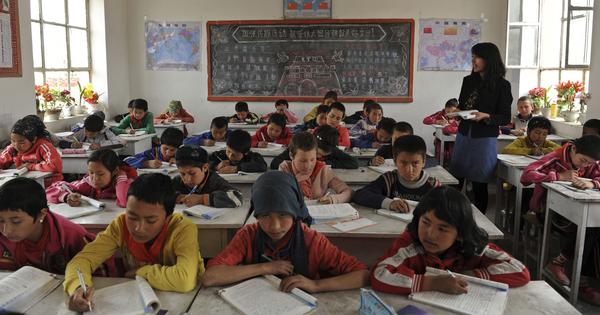
The Chinese government’s ruthless crackdown on the Uyghur people has brought international attention to the widespread human rights abuses occurring in the Xinjiang Uyghur Autonomous Region under the regime of Xi Jinping.
Less widely acknowledged is the extent to which Xi’s policies in Xinjiang reflect a broader project of social re-engineering – what Xi and Chinese Communist Party officials refer to as “soul-casting” (铸魂).
Casting the Nation
Xi demands Party officials zealously “forge” (铸牢) a consciousness of shared identity with the Zhonghua nation/race among China’s 125 million ethnic minorities.
The metaphor of forging or casting – illustrated by the ancient Chinese pictograph鑄 (zhù) – provides a powerful lens through which to understand how the fear of incompleteness is driving Party-state officials in China to solidify the souls of its citizens.
Just as the character depicts molten metal being poured into a sand mould, the CCP is melting down the heterogeneity of minority cultures and recasting them in Party-defined norms through forced assimilation and cultural erasure.
The task of “casting souls and educating people” (铸魂育人) is most onerous among the Uyghurs as they are believed to be furthest from the Han normative centre and subjected to the corrupting influences of Arab and Islamic cultures.
Xi has repeatedly spoken about the need for a “soul engineering project” (灵魂工程) if the Party is to lead the Chinese people in achieving his so-called China dream. Writers, educators, and most importantly, Party officials are termed “engineers of the soul” (灵魂的工程师), responsible for transforming “rudderless souls” (无魂的躯壳) and “cancerous cells” (癌细胞) into patriotic citizens with the “red gene” (红色基因) and the “correct” (正确) view of the nation (its history, culture, and identity) as well as the Party’s leadership.
A population pathologised
The spate of terrorist attacks carried out by a small number of radicalised Uyghur militants – most notably the brutal March 1, 2014, knife attack at Kunming train station – shocked the nation.
Rather than adopting a targeted counter-terrorism strategy, the state pathologised the entire Uyghur population, portraying them as afflicted with a kind of ideological illness or hallucinogenic delusion.
Possibly over a million Uyghurs were detained extra-judicially in large-scale camps, where they were subjected to what officials termed “concentrated transformation through education” (集中教育转化).
State schooling – beginning now at age four – has placed soul-casting at its core. Under Xi, the Party has rewritten and standardised textbooks and curricula, mandated Putonghua-medium instruction, and placed Han-centric Party norms, history, and symbols at the core of the education system.
Across Xinjiang, the Party-state has created a panopticon of mass surveillance. The aim is to identify and then correct “deviant” thought and behaviour through self-censorship and more targeted re-education work. This includes the use of facial recognition cameras, social media and phone monitoring, the collection of DNA and other biological samples, and vehicle and movement tracking applications.
Through the Fanghuiju programme – an acronym for “visit the people, benefit the people, and unite the hearts of the people” (访民情、惠民生、聚民心) – and the “Becoming Family” (民族团结一家亲) campaign, the Party extends soul-casting deep into the domestic sphere.
Launched in 2014, the Fanghuiju programme deploys thousands of Han work teams to remote villages, primarily in southern Xinjiang, under the guise of poverty alleviation, state care, and counter-extremism. Building on this, the Becoming Family initiative pairs over a million Party officials with Uyghur and other minority households from 2016 onward. These Han “relatives” are required to live, eat, and even sleep alongside their assigned families – an intimate intrusion masquerading as ethnic harmony.
Labour has emerged as another key site of re-education. Through coercive labour assignments, the Party mobilises “surplus” Uyghur labour by detaching them from familial, linguistic and religious community and then assigning them to factories in Han-dominated cities like Ürümqi, Shanghai and Guangzhou.
The Party’s systematic destruction of mosques, shrines, cemeteries, and Islamic architectural features across Xinjiang constitutes not only a campaign of physical erasure, but also a calculated assault on Uyghur religious and cultural subjectivity.
Finally, the Party’s use of coercive Uyghur birth control also functions as a biopolitical tool of transformation. The sharp decline in Uyghur birth rates – up to 66% in some counties – has been achieved through forced IUD insertions, sterilisations, punitive fines, and even internment for “illegal births”.
This policy is not merely one of demographic control, but a form of biological reengineering aimed at reshaping the Uyghur body politic. Party cadres frame these policies as necessary to improve “bio-quality” (素质) and eliminate “backward and outdated” reproductive customs, marking Uyghur fertility itself as a site of ideological deviance.
In Xinjiang, we glimpse the logical endpoint of a politics that cannot tolerate difference – not just in bodies, but in souls.
James Leibold is a leading authority on the politics of ethnicity, race, and national identity in modern Chinese history and society.
A longer version of this article was originally published by Melbourne Asia Review, Asia Institute, University of Melbourne.
📰 Crime Today News is proudly sponsored by DRYFRUIT & CO – A Brand by eFabby Global LLC
Design & Developed by Yes Mom Hosting






